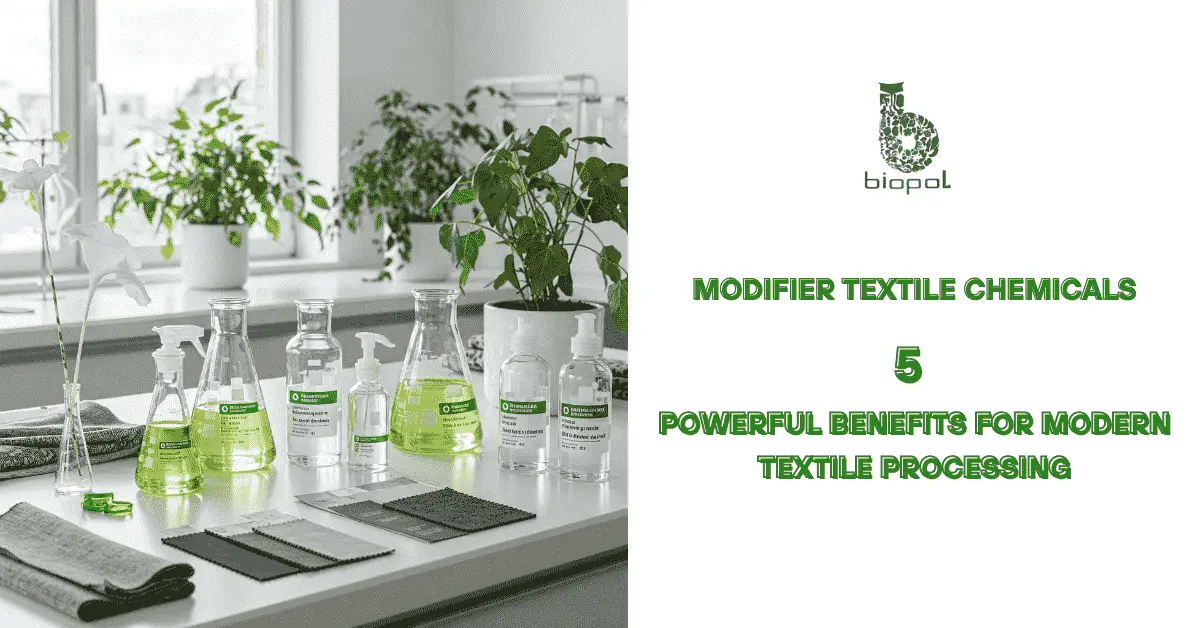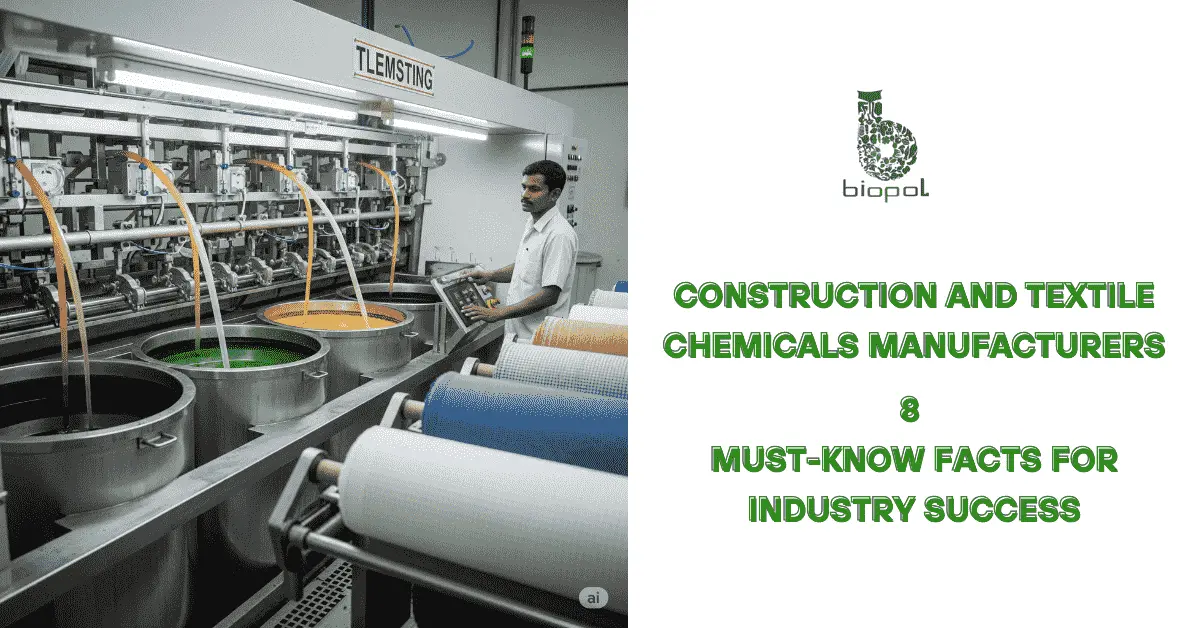
Selling textile chemicals involves offering specialized solutions that enhance fabric processing, dyeing, and finishing. From pretreatment agents to finishing additives, these chemicals improve fabric quality, performance, and durability. Success in this industry depends on technical knowledge, regulatory compliance, and strong customer relationships. As sustainability becomes a priority, eco-friendly formulations and innovative applications are key drivers of growth. Understanding client needs and market trends is essential for standing out in this competitive sector.
Table of Contents
Selling Textile Chemicals
To unlock profits by selling textile chemicals requires a strategic approach. Merely providing products is inadequate; it is essential to deliver solutions as well. The textile sector demands more than basic commodities. What strategies can be employed to maneuver through the intricacies of this market? How does one navigate the complexities of this market? Consider the following: a methodical analysis of market trends, a clear comprehension of customer requirements, and a dedication to providing high-quality products. It is vital to create a sales strategy that corresponds with the demands of the industry. To effectively seize opportunities in this market, one must take a proactive position. We took the proactive position by creating our MARKETPLACE where you can purchase the best quality textile chemicals at the most competitive prices. Go ahead and check out some Steal-Deals to make a profitable start to your day.
Industry Trends Shaping Selling Textile Chemical
Here’s a quick look at the major shifts:
Sustainability
Eco-friendly solutions are a must.
Regulations and consumer awareness drive demand.
Green chemistry is now essential.
Digitalization
Online platforms streamline transactions.
Improved supplier-buyer connections.
Better data access for forecasting.
Specialized Chemicals
High demand for functional finishes.
Performance enhancers and colorants are crucial.
Producers seek value-added products.
Who Buys Textile Chemicals and What They Need
Here’s a breakdown of the key players and their requirements:
Garment Manufacturers:
Textile Mills:
Prioritize bulk orders.
Require consistent quality.
Focus on reliability and cost-effectiveness.
Demand specialized chemicals.
Need products that enhance fabric properties (softeners, dyes, finishes).
Adhere to strict performance standards.
Processing Units:
Require a wide range of chemicals.
Need chemicals for all stages (pre-treatment to finishing).
Seek technical support.
Require suppliers who can adapt to their needs.
Common Needs Across All Buyers
Partnerships, not just vendors.
Suppliers who understand their operations.
Solutions that improve efficiency and product quality.
Reliability.
Consistency.
Expertise.
How to Stand Out in a Competitive Textile Chemical Market
For Selling textile chemicals, you have to set yourself apart in the competitive textile chemical industry, consider implementing the following essential strategies:
Understand Customer Needs:
Identify and address customer pain points (consistency, cost, regulations).
Provide solutions, not just products.
Build Strong Relationships:
Act as a trusted advisor.
Offer technical support and training.
Provide customized solutions.
Embrace Innovation:
Invest in research and development.
Offer products that meet evolving standards.
Develop sustainable, greener alternatives.
Focus on Efficiency:
Streamline the supply chain.
Offer competitive pricing.
Ensure timely delivery.
Choosing the Right Sales Channels for Maximum Reach
To maximize reach for Selling textile chemicals, consider these sales channels:
Direct Sales:
Builds strong customer relationships.
Offers control over messaging.
Requires a strong sales team.
Distributors:
Expands market reach quickly.
Leverages established networks.
Provides local market knowledge.
Loss of some control.
Online Platforms:
Provides global access.
Offers data-driven insights.
Streamlines transactions.
Lacks personal touch.
Recommendation:
Utilize online platforms for global visibility.
Adopt a hybrid approach.
Combine direct sales for key accounts.
Use distributors for wider coverage.

Pricing Strategies for Maximizing Revenue in Selling Textile Chemicals
Navigating the pricing situation in Selling textile chemicals requires a strategic approach. The focus extends beyond merely offsetting expenses; it involves seizing value and enhancing revenue potential. Here’s a breakdown of key pricing strategies to consider:
| Strategy | Description | Advantages | Disadvantages |
| Cost-Plus Pricing | Adding a fixed markup to the cost of production. | Simple and easy to implement. | May miss profit opportunities; ignores market value. |
| Value-Based Pricing | Establishing prices according to the value perceived by the customer. | Potential for higher profit margins; reflects customer worth. | Requires deep understanding of customer needs and perceived value. |
| Competitive Pricing | Matching or undercutting competitor prices. | Can help gain market share quickly. | May lead to lower profit margins; price wars. |
| Dynamic Pricing | Modifying prices according to demand, timing, or customer preferences. | Maximizes revenue during peak times; flexible. | Can be complex to implement; requires real-time data analysis. |
| Tiered Pricing | Offering different price points based on volume or features. | Captures different market segments; provides customer choice. | Can be complex to manage; requires clear differentiation of tiers. |
Selecting an appropriate pricing strategy for Selling textile chemicals is contingent upon your unique market conditions, product characteristics, and business objectives. Adopting a flexible, data-informed approach will produce optimal outcomes. Be open to experimentation and make adjustments as necessary.
Marketing Strategies for Selling Textile Chemicals
In the competitive domain of Selling textile chemicals, a well-structured promotional strategy is crucial. It’s about more than just advertising; it’s about establishing yourself as a trusted partner and knowledge leader. Below are key strategies to consider:
| Strategy | Description | Benefits | Considerations |
| Educational Workshops and Seminars | Conduct training sessions and informational events. | Builds expertise perception, increases customer understanding. | Requires strong technical knowledge and presentation skills. |
| Robust Online Presence | Develop a comprehensive website and active social media channels. | Expands reach, provides easy access to product information, enhances brand visibility. | Requires consistent content creation and online engagement. |
| Customized Solutions | Offer products and services tailored to specific customer needs. | Increases customer satisfaction and loyalty, drives sales of higher-value products. | Requires deep understanding of customer operations and needs. |
| Strategic Partnerships | Collaborate with industry associations and research institutions. | Enhances credibility, expands network, facilitates knowledge sharing. | Requires careful selection of partners and clear agreement on objectives. |
| Exceptional Customer Service | Provide prompt responses, ongoing support, and proactive solutions. | Fosters customer loyalty, generates positive word-of-mouth referrals. | Requires a dedicated customer service team and efficient communication systems. |
| Targeted Marketing | Utilize industry-specific publications, online platforms, and trade shows. | Reaches specific customer segments, maximizes marketing ROI. | Requires thorough market research and data-driven campaign management. |
Implementing these strategies effectively will not only promote your textile chemicals but also build lasting relationships with your customers, driving sustainable growth.
Meeting Industry Standards for Seamless Sales
In the textile chemical sector, adhering to industry standards is paramount for building trust and ensuring smooth Selling textile chemicals processes. It’s not just about compliance; it’s about demonstrating your commitment to quality and reliability. Here’s how to meet those crucial standards:
Quality Management Systems (QMS):
Implement ISO 9001 certification.
Establish clear quality control procedures.
Regularly audit and improve processes.
Environmental Compliance:
Adhere to REACH regulations.
Promote sustainable chemical practices.
Provide eco-friendly product alternatives.
Safety Standards:
Comply with OSHA or equivalent safety regulations.
Provide comprehensive safety data sheets (SDS).
Conduct safety training for customers.
Regulatory Compliance:
Stay updated on local and international chemical regulations.
Ensure accurate labeling and documentation.
Maintain proper records for traceability.
Technical Specifications:
Provide detailed product specifications and certifications.
Ensure products meet industry performance standards.
Offer technical support and testing services.
Ethical Business Practices:
Maintain transparent and fair business dealings.
Adhere to ethical sourcing and labor practices.
Build strong relationships with suppliers and customers.
By consistently meeting these standards, you not only ensure a seamless Selling textile chemicals process but also establish a reputation for excellence, fostering long-term customer loyalty and industry respect.
Building Long-Term Partnerships for Sustainable Sales
In the textile chemical industry, sustainably selling textile chemicals hinges on cultivating robust, long-term partnerships. It’s about shifting from transactional interactions to collaborative relationships that drive mutual growth. Here’s how to build those enduring connections:
Understand Customer Business:
Go beyond product needs; learn their operational challenges.
Anticipate future requirements and industry trends.
Provide Consistent Value:
Offer reliable product quality and timely delivery.
Share market insights and technical expertise.
Foster Open Communication:
Establish regular communication channels.
Actively solicit feedback and address concerns.
Offer Customized Solutions:
Develop products and services tailored to specific customer needs.
Demonstrate flexibility and adaptability.
Invest in Relationship Management:
Assign dedicated account managers.
Organize regular business reviews and planning sessions.
Demonstrate Ethical Practices:
Maintain transparency and integrity in all dealings.
Adhere to sustainable and responsible business practices.
By prioritizing these strategies, you can transform customer relationships into lasting partnerships, securing sustainable selling textile chemicals and fostering mutual prosperity.
The Crucial Role of After-Sales Support
In the textile chemical industry, the sale is not the end of the customer relationship; it’s the beginning of a potentially long-term partnership. Excellent after-sales support is pivotal for customer retention and building a strong reputation. Here’s why and how to provide it:
Technical Assistance:
Offer expert advice on product application and troubleshooting.
Provide on-site support or remote assistance when needed.
Ensure your team is well-trained and knowledgeable.
Prompt Responses:
Address customer inquiries and concerns quickly and efficiently.
Establish clear communication channels for support requests.
Prioritize timely resolution of issues.
Training and Education:
Conduct training sessions on proper product usage and safety protocols.
Provide educational materials and resources.
Empower customers to maximize product benefits.
Feedback and Improvement:
Actively seek customer feedback to identify areas for improvement.
Use feedback to enhance product offerings and support services.
Demonstrate a commitment to continuous improvement.
Building Loyalty:
Go the extra mile to exceed customer expectations.
Offer loyalty programs or exclusive benefits.
Cultivate a strong sense of partnership.
Scaling Up Your Textile Chemical Business for Success
To thrive in the textile chemical market, businesses must prioritize strategic sales practices. Merely selling products is insufficient; it is essential to offer solutions and cultivate enduring partnerships. Key takeaways include: understanding customer needs, embracing sustainability and digitalization, choosing the right sales channels, implementing effective pricing strategies, and adhering to industry standards.
Conclusion
Businesses must focus on building relationships, not just transactions. Offer customized solutions, educate your customers, and provide exceptional service. Invest in technology, optimize your supply chain, and prioritize quality. By adopting these strategies, you can scale your business, maximize revenue, and achieve sustainable growth. Don’t just compete; lead.
Visit BIOPOL E-SHOP today for Steal-Deals!!!
Also Read: Textile Chemicals: The Secret Sauce Behind Your Clothes

